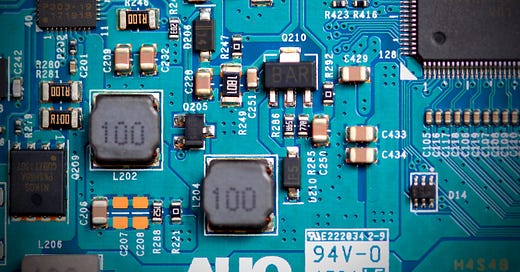Book Review: The Chip, T.R. Reid
If you never loved Physics, this is the book that will convert you
Photo by Anne Nygård on Unsplash
In I should have loved biology, James Somers talks about how the wonder of biology is lost to jargon and mere information dissemination during one’s school years.
It was only in college, when I read Douglas Hofstadter’s Gödel, Escher, Bach, that I came to understand cells as recursively self-modifying programs. The language alone was evocative. It suggested that the embryo—DNA making RNA, RNA making protein, protein regulating the transcription of DNA into RNA—was like a small Lisp program, with macros begetting macros begetting macros, the source code containing within it all of the instructions required for life on Earth. Could anything more interesting be imagined?
I should have love biology, James Somers
James’ essay captures perfectly how I feel about Physics while reading The Chip. For a subject, a deep understanding of which eludes most people, Semiconductor physics and how it came to be, is intriguing, entertaining and insanely riveting when narrated by T.R. Reid. I’ve read a fifth of the book till now, and feel torn between reading it in a night and savoring the surprises for as long as possible.
William Shockley, 1956 Nobel Laureate in Physics, wrote in his Nobel lecture
Frequently, I have been asked if an experiment I have planned is pure or applied research; to me it is more important to know if the experiment will yield new and probably enduring knowledge about nature. If it is likely to yield such knowledge, it is, in my opinion, good fundamental research; and this is much more important than whether the motivation is purely esthetic satisfaction on the part of the experimenter on the one hand or the improvement of the stability of a high-power transistor on the other. It will take both types to « confer the greatest benefit on
mankind » sought for in Nobel’s will.Transistor technology evokes new physics, William Shockley
December 11, 1956
Shockley, John Bardeen and Walter Brattain, scientists at Bell Labs made possible the use of semicondutors in electronics by extensive research on the transistor effect. Bardeen was a theorist, while Brattain the thorough engineer. Shockley’s talents spanned both areas and together they changed the electronics industry forever.
In keeping with Shockley’s sentiments, the author highlights the illuminating work of scientists and inventors alike - from Neils Bohr to Thomas Edison, JJ Thomson and J.A. Fleming. This quick history is easy to read, explains the Physics in a very Feynman-manner and lays the groundwork to appreciate the developments that are the core theme of the book. Unless you follow a field closely or work in it, it’s hard to appreciate the importance of any ground-breaking developments. The author gives you this necessary crash course in 50 delightful pages.
All that, though, is only part of the value the author has created. Boolean logic, logic gates, CPU clock speeds, memory chips vs logic chips, binary numbers are some of the concepts the author makes extremely simple to understand. If you believed computing machines to be complex, intimidating creations only the most-qualified engineers should tinker with, this book will change that:
Watching the way a computer has to go back to the ridiculously detailed instruction manual to check on everything it does reminds me of that wonderful scene with the two evil scientists in the Beatles’ movie Help! One white-coated scientist makes a mistake, infuriating his boss. “From now on”, the boss roars, “don’t do anything without checking with me first”. “Yes, boss”, the underling replies. Now the boss says, “Okay, come over here!” The underling starts to walk across the room. Then he remembers the rule that he has to check everything first with the boss. “Can I move my left foot?” he asks. “Can I move my right?” And so on.
The Chip, T.R. Reid
There is so much packed into this sub-300 pager that I would pause every couple of pages and just think or research a bit more about the people being discussed. The Semiconductor industry landscape has shifted considerably eastward from its infant days in America. Familiar names in semiconductors - Intel, AMD, Nvidia, Apple - are all American, yet most of their chips are built on the island of Taiwan by the Taiwan Semiconductor Manufacturing Company (TSMC). The author looks at what initiated this early shift and what America did to counter it.
A heuristic I have for determining the quality of a book is whether
it altered (and improved) my understanding of the world
it spawned new ideas of what is possible
The Chip delivers multiple times on both of those counts and I cannot recommend it enough.
Say hi on thehealthyanalyst@gmail.com or DM me on Twitter.





A first time reader of yours (hi!), led here from Goodreads; and as a fellow gobbler of knowledge, I'm compelled to suggest a random paper that I read in the past, which your first quote (Somers') in this article reminded me of: https://arxiv.org/abs/quant-ph/0103017
"Carbon—The First Frontier of Information Processing"
Perhaps something you may like as a microbiologist?